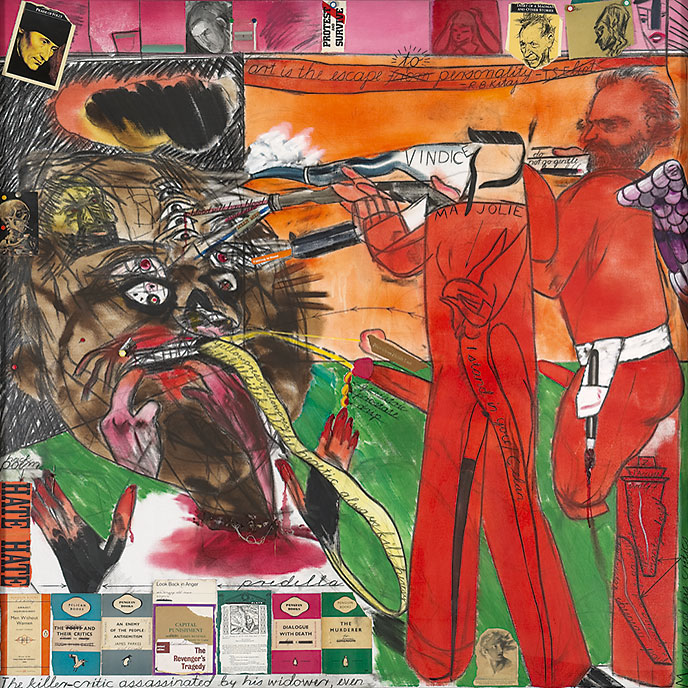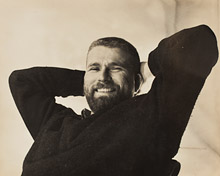
R.B. Kitaj, The Killer-Critic assassinated by his Widower, Even, 1997
Oil and collage on canvas,
152 × 152 cm
© R.B. Kitaj Estate/Astrup Fearnley Collection, Oslo, Norway - Photographer Thomas Widerberg
A retrospective of Kitaj's works, which opened in London's Tate Gallery on June 16, 1994, received scathing reviews in leading British newspapers. Kitaj felt that the critics attacked him not only as an artist, but also as an American and a Jew. Kitaj's reaction went beyond a deep feeling of hurt: he also blamed the critics for his wife's sudden death shortly after the show.
Kitaj processed these traumatic experiences in his artwork. He expressed his anger and mourning in a three-part series that he called "Sandra". In one painting in this series, "The Killer-Critic Assassinated by His Widower, Even", Kitaj defended himself against his critics. The picture is characterized by aggression, the desire for revenge, the feeling of having been judged unfairly, and sadness. In it, Kitaj creates a collage that mixes historical and fictional events and figures with his own experiences.
The conflict between the British critics and R.B. Kitaj persisted for almost a decade. Kitaj repeatedly presented works in which he attacked his critics and held them responsible for his wife's death, while the critics in turn responded with their own articles and commentaries.
"I suppose that flouting hateful pictures and commentaries on the walls at the Tate and a cosmopolitan (read Jewish) personality in the beautiful catalog was a Rash Act. In today's parlance, this was like locking onto the enemy's radar, thus inviting retaliatory blows. I knew beforehand that I would get a Bad Press because old and new enemies, (the living dead), were assembled, eager to strike.
But my flagrant exhibition was a good Blast and among my reactionary
Enemy lurked discernible (if small) evil, which the living dead will try
to deny. I believe that the pictures on the wall of the Tate were not
the real objectives. Honest criticism was almost absent. A lot of people
know that. The frenzy was brought to its furious climaxes in London's
Yellow Press by hatred of my 'transgressive' personality and its works.
Hatred to my left, hatred on my right, not exactly unknown in
cosmopolitan (Jewish) conflict and the thuggery it attracts. Anyone who
watched the unfolding drama or melodrama knows that 'war' is not the
wrong word.
I accuse my London enemies of Xenophobia. Aside from being the only prominent Jew in painting to dare to wear Jewishness on my sleeve and in my pictures, I was also the only prominent, and to 'them' - insufferably over-prominent American in London's art world.
It has been objected by the living dead that I am deranged because Auerbach, Freud, Kossoff and Caro are so well treated in London. The four Jewish artists above are not only among the very best alive - They are also easier to like than I am, according to the complex political-aesthetic-personal rules of the art game followed by the living dead. And I know I'm difficult, paranoid, an outsider-foreigner and dissident polemicist.
The evening before Max and I left London for California, when Auerbach and Freud brought Indian food to 62 Elm Park Road for a last supper, I knew that in those great painters, I was leaving behind forever the Best of England."
from: R.B. Kitaj, Tate War (I accuse!), R.B. Kitaj Estate, undated

R.B. Kitaj on his painting "The Killer-Critic assassinated by his Widower, Even" (Excerpt from the exhibition's audio guide, narrator: Peter Rigney)





